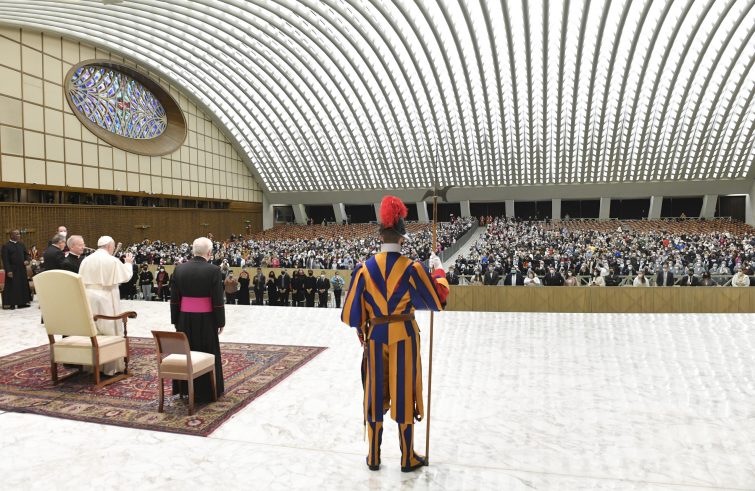
The Pope dedicated the catechesis of Wednesday’s audience in Paul VI Hall to the figure of St Joseph the Carpenter, addressing “all the workers in the world, especially those who do gruelling work in mines and certain factories; those who are exploited through undocumented work; the victims of labour: we have seen a lot of this in Italy recently; the children who are forced to work and those who rummage among the trash in search of something useful to trade…”. Francis reiterated his appeal, mentioning the “hidden workers”: “those who are exploited with undeclared work”: “the workers who do hard labour and who are paid in contraband”, he continued in unscripted remarks:
“Today there is a lot of undocumented work. [Let us think] of the victims of work, who suffer from work accidents. Of the children who are forced to work: this is terrible!
“But I think too of those who are out of work, those who feel their dignity wounded because they cannot find this work”, said the Pope. He added: “What gives dignity is not bringing bread home. You can get it from Caritas. What gives you dignity is earning bread — and
if we don’t give our people, our men and women, the ability to earn bread, that is a social injustice. The leaders must give everyone the possibility of earning bread, because this ability to earn gives them dignity.”
“Many young people, many fathers and mothers experience the ordeal of not having a job that allows them to live tranquilly. They live day to day. And how often the search for work becomes so desperate that it drives them to the point of losing all hope and the desire to live.”
“In these times of pandemic, many people have lost their jobs — we know this — and some, crushed by an unbearable burden, reached the point of taking their own lives”, Francis said remembering all those who took their own lives after having lost their jobs. “Let us take a moment of silence, remembering these men, these women, who are desperate because they cannot find work”, is the Pope’s unscripted appeal to the faithful.
“Not enough consideration is given to the fact that work is an essential component of human life, and even of the path of sanctification”, Francis remarked, pointing out that “work is not only a means of earning a living: it is also a place where we express ourselves, feel useful, and learn the great lesson of concreteness, which helps keep the spiritual life from becoming spiritualism.”
“Unfortunately, however, labour is often a hostage to social injustice and, rather than being a means of humanization, it becomes an existential periphery”,
denounced the Holy Father, for whom
“we should ask ourselves what we can do to recover the value of work; and what contribution we can make, as the Church, so that work can be redeemed from the logic of mere profit and can be experienced as a fundamental right and duty of the person, which expresses and increases his or her dignity.”
“With what spirit do we do our daily work? How do we deal with fatigue? Do we see our activity as linked only to our own destiny or also to the destiny of others?”, are the questions we should all ask ourselves.” In fact, the Pope explained, “work is a way of expressing our personality, which is relational by its nature.” Francis added in unscripted remarks: “Work is a way to express our creativity: each one of us works in their own way, with their own style: the same work but with different styles.”
“It is good to think about the fact that Jesus himself worked and had learned this craft from St Joseph”, exclaimed the Holy Father, concluding his catechesis with the prayer that Saint Paul VI lifted up to Saint Joseph on 1 May 1969: “O Saint Joseph, Patron of the Church! you, who side by side with the Word made flesh, worked each day to earn your bread, drawing from Him the strength to live and to toil; you who experienced the anxiety for the morrow, the bitterness of poverty, the uncertainty of work: you who today give the shining example,
humble in the eyes of men but most exalted in the sight of God: protect workers in their hard daily lives, defending them from discouragement, from negative revolt, and from pleasure loving temptations; and keep peace in the world, that peace which alone can ensure the development of peoples. Amen.”










